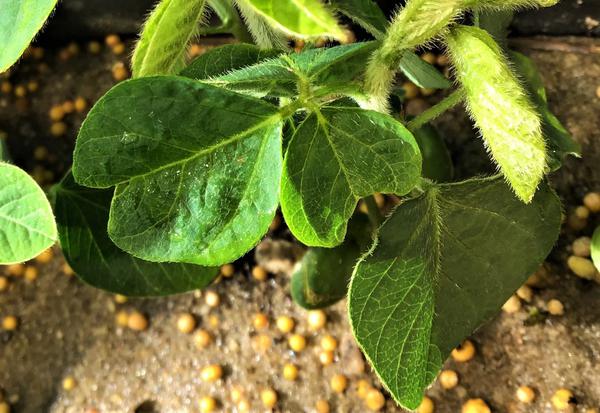Symptoms
Very-long-chain fatty acid synthesis (VLCFA)-inhibiting herbicides (herbicide group [HG] 15) cease the production of lipids, resulting in incomplete cell wall formation. Injury symptomology is leaf deformation and draw-stringing where the tip of the leaf is drawn back into the center of the leaf creating a heart-shaped leaflet (Figure 1). The draw-stringing injury can be confused or misidentified as injury from an auxin herbicide. All varieties of soybeans are prone to VLCFA-inhibiting herbicide injury. Draw-string injury can be incurred on established soybean plants if the VLCFA-inhibiting herbicides is applied post residual. Injury is transient and unlikely to cause a yield loss.
Publication date: Jan. 22, 2021
N.C. Cooperative Extension prohibits discrimination and harassment regardless of age, color, disability, family and marital status, gender identity, national origin, political beliefs, race, religion, sex (including pregnancy), sexual orientation and veteran status.
NC Cooperative Extension prohíbe la discriminación por raza, color, nacionalidad, edad, sexo (incluyendo el embarazo), discapacidad, religión, orientación sexual, identidad de género, información genética, afiliación política, y estatus de veteran.
The use of brand names in this publication does not imply endorsement by NC State University or N.C. A&T State University of the products or services named nor discrimination against similar products or services not mentioned.
Recommendations for the use of agricultural chemicals are included in this publication as a convenience to the reader. The use of brand names and any mention or listing of commercial products or services in this publication does not imply endorsement by NC State University or N.C. A&T State University nor discrimination against similar products or services not mentioned. Individuals who use agricultural chemicals are responsible for ensuring that the intended use complies with current regulations and conforms to the product label. Be sure to obtain current information about usage regulations and examine a current product label before applying any chemical. For assistance, contact your local N.C. Cooperative Extension county center.
N.C. Cooperative Extension prohibits discrimination and harassment regardless of age, color, disability, family and marital status, gender identity, national origin, political beliefs, race, religion, sex (including pregnancy), sexual orientation and veteran status.

